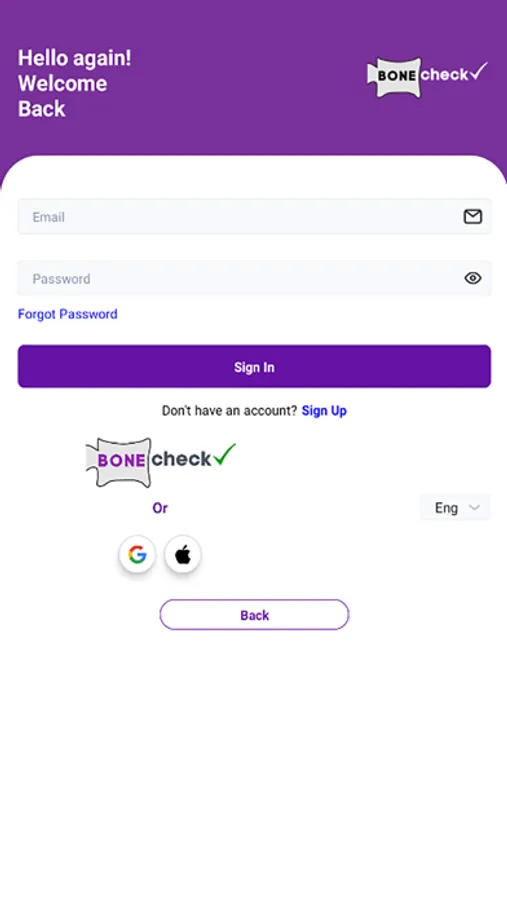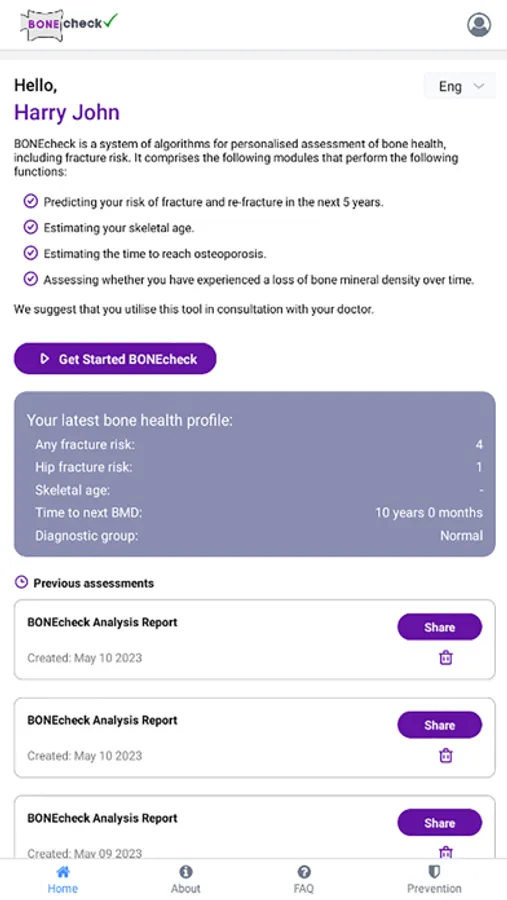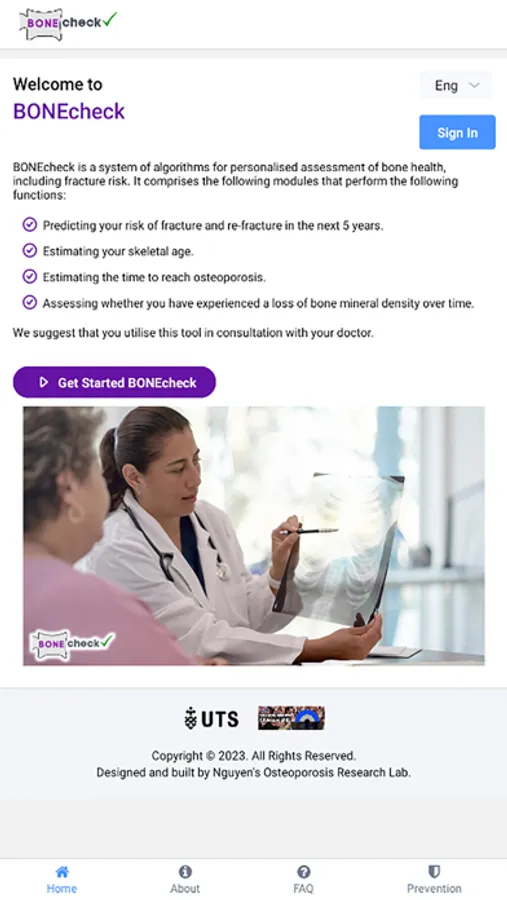About BONEcheck
Osteoporotic fracture is a significant public health problem because it is associated with an increased mortality risk. Accurate and early identification of high-risk individuals and mitigation of their risks is a core part of the treatment and prevention of fractures. This online tool aims to introduce a digital tool called 'BONEcheck' for personalized fracture risk assessment. It takes approximately 5 minutes to complete and aims to empower your bone health to initiate discussions about bone health and osteoporosis with their GP.
The development of BONEcheck primarily utilized data from the prospective population-based Dubbo Osteoporosis Epidemiology Study and the Danish Nationwide Registry. BONEcheck has 3 modules: input data, risk estimates, and risk context. Input variables include age, gender, prior fracture, fall incidence, bone mineral density (BMD), comorbidities, and genetic variants that have been shown to be associated with BMD. By utilizing published methodologies, BONEcheck generates output related to the likelihood of fracture and its associated outcomes.
The tool is designed for men and women aged 50 years and older who either have or have not sustained a fracture. Based on the input variables BONEcheck estimates the probability of any fracture and hip fracture within 5 years, skeletal age, and the recommended interval for repeating BMD. The probability of fracture is shown in both numeric and human icon array formats. The risk is also presented in the context of treatment and management options based on Australian guidelines. Skeletal age was estimated as the sum of chronological age and years of life lost due to a fracture or being exposed to risk factors that elevate the risk of mortality. The language used in the interpretation of risk estimate and risk management is written for people with a reading level of eight.
BONEcheck is the result of 30 years of research in bone and fracture, and is a tool designed to provide patients and doctors with an accurate assessment of fracture risk. What sets BONEcheck apart from other risk assessment tools is that it contextualizes the anti-fracture effect in relation to survival benefits and potential risks associated with treatment. This means that doctors and patients can engage in well-informed discussions about the patient's risk profile and make decisions based on this information. The tool is particularly useful for patients with osteoporosis or those at high risk of fracture, as it can help them to better understand their condition and make informed decisions about their treatment options. Overall, BONEcheck is a valuable tool that can significantly improve patient outcomes and help to reduce the incidence of fractures in high-risk populations.
The results produced by BONEcheck should serve as a guide only and are not intended to substitute for professional advice. The interpretation of results should be done by appropriate scientific and/or clinical training individuals. If concerned about your fracture risk, it is important to consult your doctor or a bone specialist. BONEcheck is designed and built by Nguyen's Osteoporosis Research Lab, as a result of our publications, please find more information about our research via our website.
Public access to BONEcheck is via https://bonecheck.org.
The development of BONEcheck primarily utilized data from the prospective population-based Dubbo Osteoporosis Epidemiology Study and the Danish Nationwide Registry. BONEcheck has 3 modules: input data, risk estimates, and risk context. Input variables include age, gender, prior fracture, fall incidence, bone mineral density (BMD), comorbidities, and genetic variants that have been shown to be associated with BMD. By utilizing published methodologies, BONEcheck generates output related to the likelihood of fracture and its associated outcomes.
The tool is designed for men and women aged 50 years and older who either have or have not sustained a fracture. Based on the input variables BONEcheck estimates the probability of any fracture and hip fracture within 5 years, skeletal age, and the recommended interval for repeating BMD. The probability of fracture is shown in both numeric and human icon array formats. The risk is also presented in the context of treatment and management options based on Australian guidelines. Skeletal age was estimated as the sum of chronological age and years of life lost due to a fracture or being exposed to risk factors that elevate the risk of mortality. The language used in the interpretation of risk estimate and risk management is written for people with a reading level of eight.
BONEcheck is the result of 30 years of research in bone and fracture, and is a tool designed to provide patients and doctors with an accurate assessment of fracture risk. What sets BONEcheck apart from other risk assessment tools is that it contextualizes the anti-fracture effect in relation to survival benefits and potential risks associated with treatment. This means that doctors and patients can engage in well-informed discussions about the patient's risk profile and make decisions based on this information. The tool is particularly useful for patients with osteoporosis or those at high risk of fracture, as it can help them to better understand their condition and make informed decisions about their treatment options. Overall, BONEcheck is a valuable tool that can significantly improve patient outcomes and help to reduce the incidence of fractures in high-risk populations.
The results produced by BONEcheck should serve as a guide only and are not intended to substitute for professional advice. The interpretation of results should be done by appropriate scientific and/or clinical training individuals. If concerned about your fracture risk, it is important to consult your doctor or a bone specialist. BONEcheck is designed and built by Nguyen's Osteoporosis Research Lab, as a result of our publications, please find more information about our research via our website.
Public access to BONEcheck is via https://bonecheck.org.


